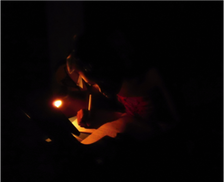 A girl studies by kerosene lamp in rural Haiti. A girl studies by kerosene lamp in rural Haiti. By Allison Archambault Globally, the electricity sector is changing. Two megatrends underlie the necessity of the transition: Climate Change and Energy Access. Worldwide 1.2 billion people lack access to electricity and instead spend large amounts of money on low quality energy services such as kerosene, candles and charcoal. Each year, 4 million people die due to indoor air pollution from these inefficient sources of energy and countless more remain locked in poverty. Ironically, important innovation in decarbonizing the global energy supply may come from remote villages that have not yet seen electricity. Where there is no incumbent infrastructure, there is an opportunity to build energy systems with today's best technologies and business models. These models that leverage clean energy, storage, smart grid, and customer participation can be adapted and transferred – South to North – to inform the evolving utility business models in established markets. Smart Meters, Scalable Solutions Building infrastructure from scratch – where no incumbent exists – means it is possible to leapfrog directly to today’s best technologies and business models, but best practices in smart grid, tariff structures, and grid resiliency have not yet been clearly defined for the ‘energy access’ markets. Enter EarthSpark. When no low-cost, high-functionality smart meters existed on the market for EarthSpark’s inaugural grid in 2012, EarthSpark developed prototype smart meters to meet its needs. In 2013, EarthSpark spun off the smart metering company SparkMeter, Inc., which is now enabling grid operators to increase energy access and improve operations in 5 countries. EarthSpark drives practical innovation to meet the needs of the rural poor, and EarthSpark is now developing a scalable model for microgrid development and operation. Bundling technical innovation, community engagement, diverse partnerships, and novel financing, EarthSpark is building project-based change and ‘de-risking by doing.’ EarthSpark International EarthSpark is a non-profit organization working to expand access to high-quality energy services. EarthSpark's mission: eradicate energy poverty. Our method: do the research and development on business models that can spin off and scale to address specific aspects of energy poverty. So far, we have spun off Enèji Pwòp, S.A., a Haitian social enterprise, and SparkMeter, Inc., a smart meter technology company. We have also built a first-of-its-kind, town-sized, solar-powered, smart grid in rural Haiti. Working in Haiti since 2009, EarthSpark International has sold over 18,000 small-scale clean energy products ranging from solar lanterns to efficient cookstoves. In 2012, EarthSpark turned on a first-of-its-kind privately operated pre-pay microgrid in Les Anglais, Haiti, a small town that had never before had grid electricity. In 2015, EarthSpark expanded the grid to 430 connections, directly serving over 2000 people with 24-hour electricity powered primarily by solar energy and battery storage, cutting customers’ energy costs by up to 80% over previous energy sources. The community-scale grid is large enough to power small industry while progressive enough to offer accessible service to every single resident living within the infrastructure’s footprint. For those living beyond the grid, EarthSpark continues to support local entrepreneurs in the sale and support of stand-alone solar products. Unlocking Potential: From One to Eighty Grids
EarthSpark aims to build eighty microgrids in Haiti by the end of 2020. With one grid up and running, EarthSpark has learned much, but to get to 80, several barriers need to be cleared. With local partners, EarthSpark has led a 100-town microgrid market assessment for Haiti and worked at several levels to clarify the Haitian legal and regulatory landscape for microgrid development and operation. Planning is one thing, executing is another, and the ‘process risk’ in microgrid development remains extremely high. EarthSpark is seeking grant funding to build the next three grids and, in parallel, to build the experience-backed fundable plan for the next 40 grids. EarthSpark’s microgrid development experience to-date has underlined the truth that implementation of a process – the actual building of grids – is by far the best way to de-risk the process for future developments. Integrated Electrification: Empowering People with more than Watt-Hours Electricity in and of itself is useless. It’s what one does with each watt-hour that is truly transformative. With highly efficient appliances, productive uses of electricity, and thoughtful demand management, not only can customers make the most of newly available electricity, operators can maximize customer value and grid revenue. EarthSpark works with communities and customers to deeply assess energy service needs and opportunities. EarthSpark also takes a ‘feminist electrification’ approach to infrastructure planning, ensuring that women’s voices and roles are important throughout the planning and implementation of the electrification process. Microgrids, Community Resilience + Sustainable Energy for All To meet Sustainable Energy for All goals, 40% of all new connections will come from microgrids. Around the world, local governments are looking to microgrids to harden critical infrastructure and improve resiliency. Innovation is portable, and in building a model for clean, smart, transformative community infrastructure, EarthSpark is pursuing deep solutions to both energy access and climate change. Join us!
1 Comment
Joseph Auo
6/23/2016 09:31:30 pm
This is very interesting micro model and would like to know more as I see that this is what is required around the Globe especially in 3rd world countries where people hunger for electricity for lighting cooking and refrigeration in small communities of 300-500 people and also villages less than 100 people.
Reply
Your comment will be posted after it is approved.
Leave a Reply. |
EarthSpark supporters make our work possible. Thank you for considering a donation towards eliminating energy poverty in Haiti.
Read the full blog - click here!
|
EarthSpark International is a non-profit 501(c)3 organization.

